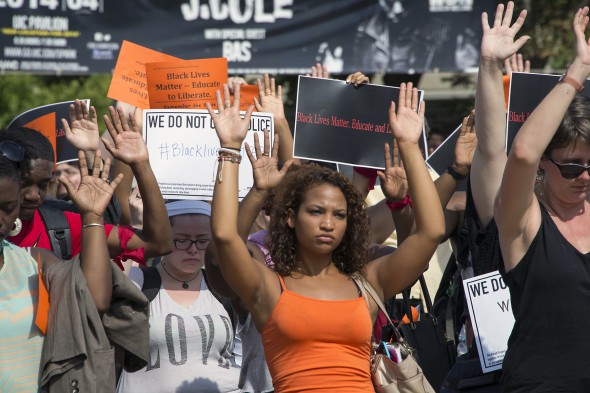Students, faculty speak out against police brutality

UIC students and faculty gather at the UIC Quad Monday to protest police brutality and the shooting of Michael Brown. Photo: Roberta Dupuis-Devlin/UIC Photo Services
By Gary Wisby & Nicole Cardos
“Hands up!” shouted the speaker.
“Don’t shoot!” chorused his listeners, raising their hands.
That call-and-response punctuated Monday’s event at the UIC Quad, a protest of the shooting of Michael Brown in Ferguson, Missouri — and, in a larger sense, police brutality against black people.
More than 100 students and faculty showed up — many, as requested, wearing black. Some also wore red armbands and carried signs: “Black lives matter — educate to liberate,” “We do not call police,” “End police brutality,” “Abolish the police.”
Student Zakkiyyah Dumas read the names of 13 unarmed young people who died recently at the hands of police, ending with Michael Brown. After she read each name, graduate student Marco Ro did a “libation,” pouring water into a potted plant as the audience chanted “Ashe” (ah-SHAY).
“Last year in this country, police shot two black people a week,” said student Jauwan Hall said. “Black lives like Mike Brown’s are not valued. He had goals and aspirations, and the right to walk through the neighborhood and not be killed.”
Black people are incarcerated at six times the rate of whites, he said. “We have been rendered bootless in a society that tells us to pull ourselves up by our bootstraps.”
Student Evan Taylor, who organized the protest, said race is still an issue at UIC. While 33 percent of Chicagoans are black, only 8 percent of the student body is black, he said. And only 24 to 42 percent of those students will graduate, he added.
“At a world-class institution, black students are still treated as second-class citizens,” Taylor said, repeating the sentence twice more. “UIC is known for being a research institution, but little to no research is done on how to increase black admissions, enrollment, retention and graduation.”
Taylor said students want to meet with Tyrone Forman, vice provost for diversity, to talk about increasing black student admissions. He announced that the first meeting of the Black Student Union will be held at 4 p.m. Thursday in the African American Cultural Center, Addams Hall.
Ro, one of the protest organizers, said of Brown’s slaying, “It could happen to me, or to someone I love. I think that we need to stand up because black life is regarded cheaply, and I think we need to fight for our liberation.”
He added, “Black disposability not only affects us in terms of how we interact with the police, but also how we interact with university administrators. Too often in our classrooms we’re not supported, in terms of institutional support. We’re not valued in a way that allows us to thrive in the university.”
Ashley Stone, an academic counselor in the African American Academic Network, said she hoped the demonstration will empower students to mobilize for equality. “It’s time for us to respect human life, whatever color, whatever affiliation, whatever sexual preference,” she said. “It’s time for us to start humanizing each other.”
Ewa Ewa, a junior in the College of Liberal Arts and Sciences, said, “It’s cool to see us addressing things other than academics on the first day of school, and things happening outside of school.”
Editor’s note: this story has been updated to correct an error: the reading of the names was done by student Zakkiyyah Dumas and the pouring of the water was by graduate student Marco Ro.
